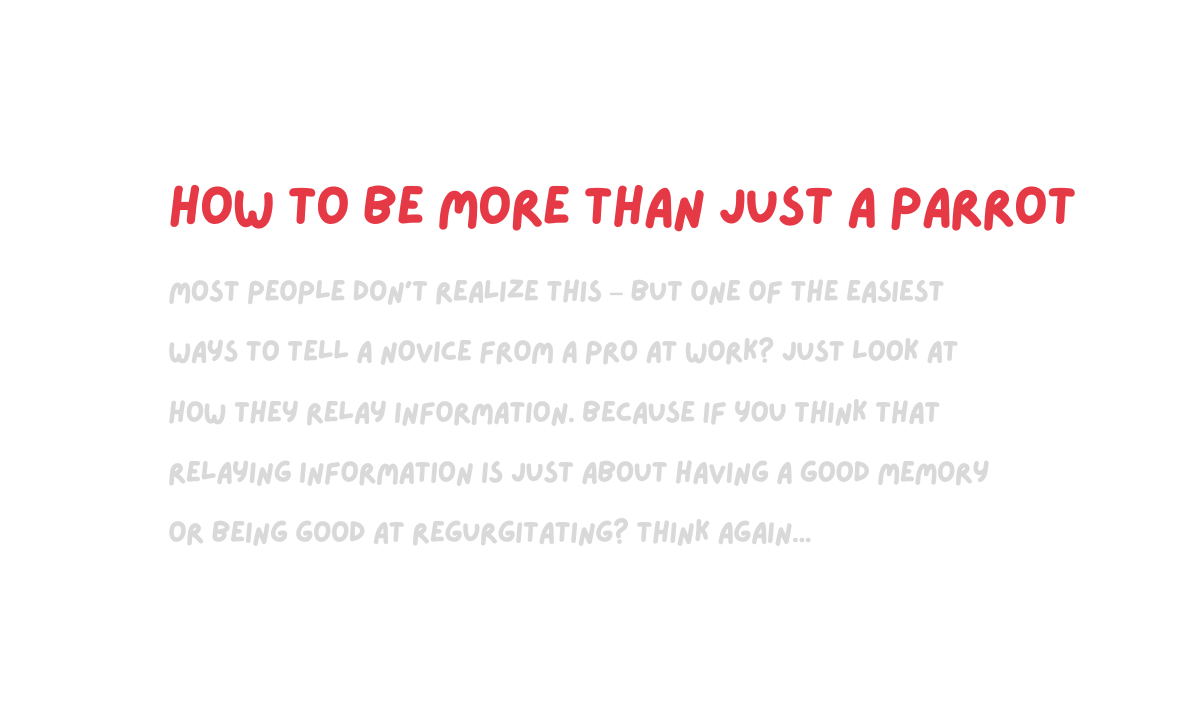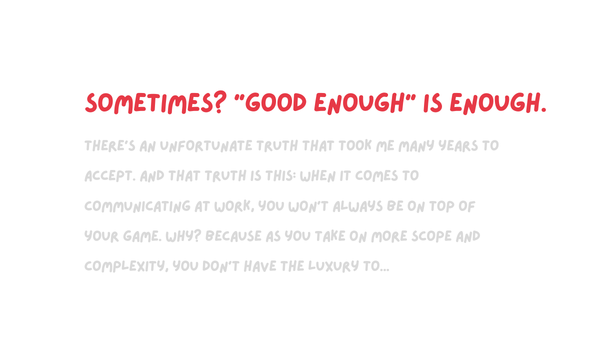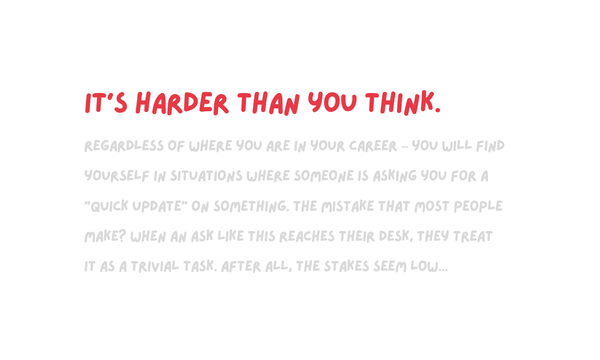The easiest way to tell a novice from a pro

Most people don't realize this – but one of the easiest ways to tell a novice from a pro at work?
Just look at how they relay information.
Because if you think that relaying information is just about having a good memory or being good at regurgitating? Think again. There are levels to it.
In fact, when information relaying isn't done well, it can often lead to things like:
- Miscommunication
- Unnecessary swirl
- Wasted effort
- Frustration
- Distrust
And in today's issue, we'll talk about the 5 levels of relaying information – and what separates the best operators from the rest:
- Parroting
- Synthesizing
- Contextualizing
- Commentating
- Filtering
👋 Join 4600+ readers and subscribe to Herng's Newsletter for free:
📍 Level 1: Parroting
The most basic and literal form of relaying information at work?
I call it parroting.
All you're doing is telling A what B said – or telling A what B said C said. Verbatim.
This looks something like:
Manager: "Sorry I couldn't join that meeting just now, but what was the feedback from our stakeholders?"
❌ You: "So Adam said that our new process was too confusing, and that he would prefer more prescriptive templates. But then Bernice said that her team actually didn't mind the fact that we gave them more control, which made the process easier for them. Then Chris chimed in and agreed with Bernice, but proposed a alternative for us to consider, which was..."
You get the point. Parroting information is exactly what it sounds like. You pass on 100% of the information – yet add very little value to the process.
(If anything, you might actually be creating negative value, as this act tends to cause frustration and confusion for the listener.)
So what's slightly better than this?
👋 Subscribe for free to get Herng's newsletter directly in your inbox.
📍 Level 2: Synthesizing
If you're able to synthesize and summarize information – you at least save others time.
Using the aforementioned example, that might look something like:
"Most of our stakeholders were OK with our new process, but there were two pieces of feedback that stood out. One was from Adam, who believed that our new process actually creates more swirl. The other was from Denise, who believed that the process is largely fine, except the timelines are too tight."
This requires a high degree of finesse. You need to synthesize the key takeaways, drop unnecessary details – yet articulate things in a way that doesn't lose nuance.
It's not rocket science, of course, But it's also not easy.
This is not enough for the best operators, however. Which takes us to the next level...
📍 Level 3: Contextualizing
Relaying information is not just about summarizing and saving people time.
It's also about providing people with context, and any other relevant information that isn't necessarily part of the actual spiel.
In other words, you're not just reassembling what's readily apparent based on what people have said.
Instead, you recognize that all the pieces matter, because nuance and context is everything.
Consider the following examples, where you don't just pass on what you've heard, but actively supply valuable context:
"In my meeting with Lester, he told me that funding Project Hamster is absolutely critical. I should note, however, that this is inconsistent with his team's top priorities, which have already been ratified and socialized."
"In the forum with leadership last week, we were asked to explain the reasons behind the spike in Business X. However, note that this came up as a good-to-have, rather than a critical gap. In fact, most of the meeting actually focused on examining Business Y..."
"I just spoke to Frank, who asked a lot of questions about the projected impact of Project Patapsco and he appeared very skeptical of it. I believe this might be related to the recent reprioritization exercise in their org, which might explain the sudden attitude change."
Information relaying is all about context. In fact, omitting context is what often leads to swirl and churn.
For instance, imagine a situation where you're on the hook to cascade an ask from your global counterpart to your local market stakeholders.
You could simply pass along the ask without much thought, e.g. –
❌ You: "Hi local market leads: our global team would like to better understand emerging trends from each of our markets. Could you provide me with the top user trends you're seeing?"
But what happens as a result? People have no idea whether this is meant to be a 10-minute or a 10-hour exercise. They also do not know how their work will be surfaced.
So when that happens? People get antsy. And if you can't provide satisfactory answers, people either ignore you, or over-correct by over-engineering.
(And the next time you have another ask? Be prepared for the groans.)
But consider an alternative scenario, where you go the extra mile to supply context:
✅ You: "... But please note that this is not meant to be a heavy lift – our global team simply wants to source some unique insights to illustrate the diversity of our markets for this one slide in this upcoming forum. Please don't spend more than 10 minutes on this exercise."
The difference is night and day. Because your stakeholders now actually have a clear sense of how their inputs are going to be used – which helps them determine how much granularity, precision, and polishing are required.
You'll also save them tons of time as a result.
Hold on, you might say: Isn't that cheating?
Because we didn't just simply pass on information or add context. We also explicitly told people how much time we thought they should spend on it – despite it not being in the original message.
Well, that's precisely the point, because...
👋 Subscribe for free to get Herng's newsletter directly in your inbox.
📍 Level 4: Commentating
The best operators know that relaying information isn't just about rehashing. You have the license (and often the obligation) to add your own spin on it – and that's often where you actually add value.
Because repeating information is easy. Even summarizing isn't hard either. But what's truly helpful, is if you can spot the "so what" – and make things just a bit easier for the next person.
For instance, consider the following:
❌ You: "I attended our quarterly business review last week, where Emily challenged our decision to double down on XYZ initiative. She also was confused by why we chose to work with Partner A instead of Partner B. She also asked for the source behind these 3 datapoints..."
OK, so it's a factual recap. But you're stuck at Level 1.
What happens, however, if you challenge yourself to figure out the meta-themes behind what's happening?
Then it might sound something like:
✅ You: "I attended our quarterly business review last week. In short, Emily was not quite sold on our strategy. I can talk through the follow-up's, but I think the underlying theme is that she is unaware of the historical context of the partner dynamics in our market, as well as how regulation limits what we're able to do. It might bode us well to set up a one-off session with her to clarify some of these things..."
Let me be clear – a bias towards commentating does not mean that you're forced to put your own spin on everything. Not does it give you the liberty to over-extrapolate.
Rather, the key is to keep asking yourself:
"What do I want my audience to do with this information I'm relaying? And how do I help them get there faster?"
Sure, you can do that by simply regurgitating what you heard during the meeting and provide a laundry list of action items. Your audience will get there eventually. But you add no value.
Or you can consciously spot the question behind the question – and find a way to bias towards action.
(Related reading: What does it actually mean to have a "strong" point of view at work?)
👋 Subscribe for free to get Herng's newsletter directly in your inbox.
📍 Level 5: Filtering
Relaying information isn't about passing on everything.
If you're really good at what you do – you know what to pass on, and what to hold off on.
Because sometimes? More isn't necessarily better.
When does it make sense to filter the information you pass on? It could be for any of the following reasons:
- It's not the right timing, e.g. your stakeholders are in the midst of meeting a deadline, and you know the best strategy is to come back at a later point
- You want to avoid drip-feeding, e.g. you anticipate that more information will trickle in, and you want to only go to people once everything is in place
- You want to avoid confusion, e.g. if something might serve to confuse rather than help, you might decide to spare your audience the mindspace
But here's the thing – you need a license to be a good filter. You can't do it well if you don't have a strong sense of empathy for what your audience cares about, or if you don't have a deep understanding of how they prefer to operate.
To be a strong filter – it requires putting yourself in others' shoes.
Only then can you be sure that you're doing more good than harm.


